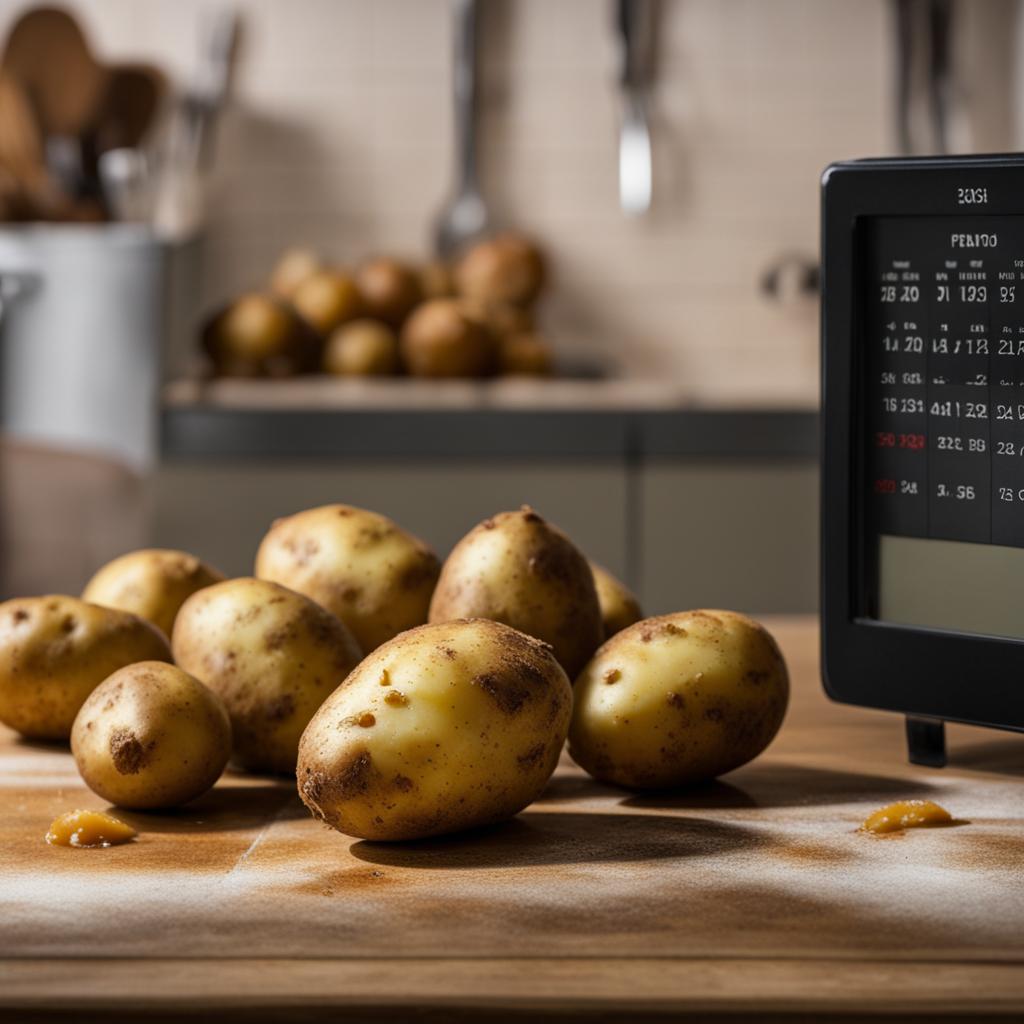Hello, I’m here to guide you on how to determine if your potatoes have gone bad. Potatoes are a staple in many households, but sometimes they can spoil without us even realizing it. In this guide, I’ll show you how to identify the signs of spoilage and ensure your potatoes are fresh and safe to eat.
Key Takeaways:
- To tell if a raw potato is bad, check for a soft texture, wrinkled skin, or a bad smell.
- Cooked potatoes should have a strong foul odor or visible mold if they are bad.
- If a potato has sprouted, you can still eat it by cutting off the sprouts.
- Eating green potatoes is not recommended, as they can contain the toxic compound solanine.
- Store raw potatoes in a cool, dry place and avoid storing them near onions or apples.
Signs of Bad Raw Potatoes
When it comes to determining if raw potatoes are bad, there are a few key signs to look out for. These signs can help you identify whether the potato is still fresh and safe to eat or if it has started to spoil.
One of the most common signs of bad raw potatoes is a change in texture. If the potato feels soft or mushy when you squeeze it, this is an indication that it is no longer fresh. Another sign to watch out for is wrinkled skin. If the potato’s skin appears shriveled or wrinkled, it may be a sign that it has started to spoil.
The smell of the raw potato can also be a clue. If the potato has a strong, unpleasant odor, it is likely that it has gone bad. Trust your nose and if it smells off, it’s best to err on the side of caution and discard the potato.
Table: Signs of Bad Raw Potatoes
| Signs | Description |
|---|---|
| Soft texture | If the potato feels soft or mushy when squeezed, it may be bad. |
| Wrinkled skin | Shriveled or wrinkled skin is a sign that the potato has started to spoil. |
| Bad smell | A strong, unpleasant odor indicates that the potato has gone bad. |
By paying attention to these signs, you can ensure that you only consume fresh and safe raw potatoes. If you notice any of these signs, it’s best to discard the potato to avoid the risk of foodborne illness.
Signs of Bad Cooked Potatoes
When it comes to cooked potatoes, there are a few key signs that indicate they have gone bad. One of the most obvious signs is a strong foul odor. If your cooked potatoes emit an unpleasant smell, it is a clear indication that they have spoiled and should not be consumed. Additionally, the presence of visible mold on the surface of the potatoes is another telltale sign of spoilage. Mold can appear as fuzzy patches or greenish-black spots, and consuming potatoes with mold can lead to foodborne illness.
It is important to note that bad cooked potatoes should not be confused with cooked potatoes that have been stored in the refrigerator for a few days. Over time, cooked potatoes may develop a slightly different texture and taste, but as long as they are free from odor and mold, they are generally safe to eat within 3 to 4 days of being cooked.
To ensure the freshness of cooked potatoes, it is recommended to store them in an airtight container in the refrigerator. This helps to prevent the growth of bacteria and slow down the spoilage process. If you have leftover cooked potatoes that you don’t plan on consuming within a few days, they can be frozen for longer storage. Freezing cooked potatoes can extend their shelf life up to 10 to 12 months, but it is important to label the container or bag with the date of freezing for easy reference.
| Signs of Bad Cooked Potatoes | Action to Take |
|---|---|
| Strong foul odor | Do not consume; discard the potatoes |
| Visible mold | Do not consume; discard the potatoes |
| Texture and taste changes, but no odor or mold | Generally safe to eat within 3 to 4 days of being cooked |
| Store in an airtight container in the refrigerator | To maintain freshness for up to 3 to 4 days |
| Freeze for longer storage | Label the container or bag with the date of freezing |
Can You Eat Sprouted Potatoes?
Have you ever wondered if you can still eat potatoes that have sprouted? The answer is yes, you can! When a potato sprouts, it is an indication that it is trying to grow. However, the sprouts themselves are not harmful and can be easily removed.
To enjoy sprouted potatoes, simply cut off the sprouts using a sharp knife or vegetable peeler. Make sure to remove any green parts as well, as they can contain a toxic compound called solanine. Once you’ve removed the sprouts and green parts, the rest of the potato is good to go and can be prepared and cooked as usual.
Sprouted potatoes can have a slightly different texture and taste compared to fresh ones, so keep that in mind. However, they are still safe to eat as long as you take the necessary steps to remove the sprouts and green parts. So don’t let those sprouts go to waste, and enjoy your potatoes without any worries!
Table: Can You Eat Sprouted Potatoes?
| Situation | Actions to Take |
|---|---|
| Potato has sprouted | Cut off the sprouts and any green parts |
| Rest of the potato | Safe to eat and can be prepared as usual |
Are Green Potatoes Safe to Eat?
When it comes to green potatoes, the answer is not always straightforward. While slightly green potatoes are generally safe to eat, it is important to exercise caution when dealing with heavily green-colored potatoes or potatoes that have a green hue throughout. These green potatoes contain a toxic compound called solanine, which can cause illness if consumed in large amounts.
If you come across a potato that is very green or has a green color throughout, it is best to err on the side of caution and throw it out. Consuming these green potatoes can lead to symptoms such as nausea, vomiting, diarrhea, and headaches. It is important to prioritize food safety and minimize the risk of ingesting harmful substances.
To ensure you and your loved ones stay safe, be sure to properly store potatoes in a cool, dry place. Avoid storing them near ethylene-producing fruits like onions and apples, as these can speed up the sprouting process and increase the likelihood of potatoes turning green. Additionally, refrain from washing potatoes before storing them, as excess moisture can promote spoilage.
Remember, it’s always better to be safe than sorry when it comes to consuming green potatoes. When in doubt, throw them out and choose fresh, non-green potatoes for your meals.
| Greenness of Potatoes | Safety |
|---|---|
| Slightly Green | Generally safe to eat |
| Very Green or Entirely Green-Colored | Best to throw out |
How to Store Raw Potatoes
Properly storing raw potatoes is essential for preserving their freshness and extending their shelf life. Here are some tips on how to store raw potatoes:
- Use a breathable bag or container: Store whole, raw potatoes in a breathable bag or container that allows for air circulation. This helps prevent moisture buildup and reduces the risk of mold or rot.
- Avoid washing before storing: Do not wash raw potatoes before storing them. Excess moisture can promote spoilage, so it’s best to leave them unwashed until you’re ready to use them.
- Find a cool and dry place: Choose a cool, dry place to store your raw potatoes, such as a pantry, basement, or cellar. These areas provide a stable temperature and humidity level, which helps prolong their freshness.
- Avoid proximity to onions and apples: Keep raw potatoes away from onions and apples. These fruits emit gases, including ethylene, that can speed up the sprouting process in potatoes.
By following these storage guidelines, you can help ensure that your raw potatoes stay fresh and ready to use for an extended period.
Table: Storage Tips for Raw Potatoes
| Storage Method | Recommendation |
|---|---|
| Bag or Container | Use a breathable bag or container for air circulation. |
| Washing | Avoid washing potatoes before storage to prevent excess moisture. |
| Temperature and Humidity | Store potatoes in a cool, dry place like a pantry or cellar. |
| Avoid Proximity | Keep potatoes away from onions and apples to prevent sprouting. |
Table: Storage Tips for Raw Potatoes
How Long Do Raw Potatoes Last?
When it comes to the shelf life of raw potatoes, proper storage is key. If stored correctly, raw potatoes can last up to 2 months. It’s important to eat them within this timeframe to ensure their freshness and quality. Let’s explore some tips on how to maximize the longevity of your raw potatoes.
Proper Storage for Raw Potatoes
Storing raw potatoes in a cool, dark, and well-ventilated place is essential. A pantry, cellar, or basement are suitable options. Avoid storing them near ethylene-producing fruits like onions and apples, as the gases emitted can accelerate sprouting. Additionally, do not wash the potatoes before storage, as excess moisture can promote spoilage.
Tips for Prolonging Shelf Life
- Use a breathable bag or container to allow air circulation around the potatoes.
- Avoid washing the potatoes until you’re ready to use them. This helps prevent moisture buildup.
- Inspect the raw potatoes regularly for any signs of spoilage, such as soft spots, mold, or a foul smell.
- If you notice any bad potatoes, remove them from the storage area to prevent contamination.
By following these guidelines, you can ensure that your raw potatoes stay fresh and safe to consume for up to 2 months. Remember to always check for signs of spoilage before using them in your recipes.
| Storage Method | Shelf Life |
|---|---|
| Cool, dark place (pantry, cellar) | Up to 2 months |
| Refrigerator | 1 to 2 weeks |
| Freezer | 8 to 12 months |
Remember, the actual shelf life of raw potatoes may vary depending on factors such as quality and storage conditions. It’s always best to inspect them before use to ensure they haven’t gone bad.
How to Store Cooked Potatoes
After enjoying a delicious meal with cooked potatoes, it’s important to store any leftovers properly to maintain their freshness and quality. By following the right storage methods, you can extend the shelf life of cooked potatoes and reduce the risk of food waste. Here are some tips on how to store cooked potatoes:
1. Use an Airtight Container
When storing cooked potatoes, it’s crucial to use an airtight container. This helps to protect the potatoes from exposure to air, which can cause them to spoil quickly. Opt for a container with a tight-fitting lid that seals well to ensure maximum freshness.
2. Store in the Fridge
Place the airtight container of cooked potatoes in the refrigerator. The cool temperature of the fridge helps to slow down the growth of bacteria, keeping your potatoes fresh for a longer time. It’s recommended to consume the cooked potatoes within 3 to 4 days to maintain their taste and texture.
3. Freeze for Long-Term Storage
If you have a larger quantity of cooked potatoes that you won’t be able to consume within a few days, freezing is a great option. Transfer the potatoes to a freezer-safe container or freezer bag, making sure to remove any excess air. Label the container or bag with the date of freezing to keep track of its storage time.
| Storage Method | Storage Time |
|---|---|
| Fridge | 3 to 4 days |
| Freezer | 10 to 12 months |
By following these storage guidelines, you can enjoy leftover cooked potatoes for longer periods, reducing waste and maximizing their usability in future meals. Remember to always check for signs of spoilage, such as an unusual odor or the presence of mold, before consuming stored cooked potatoes.
How Long Do Cooked Potatoes Last?
When you have leftover cooked potatoes, it’s important to store them properly to maintain their freshness and quality. Cooked potatoes can be refrigerated for 3 to 4 days, allowing you to enjoy them as a convenient and delicious side dish throughout the week. Simply transfer the cooked potatoes to an airtight container and place them in the refrigerator to keep them fresh.
If you have more cooked potatoes than you can consume within a few days, freezing them is a great option. Cooked potatoes can be frozen for 10 to 12 months, giving you the flexibility to enjoy them at a later time. It’s recommended to label the container or bag with the date of freezing to keep track of their freshness.
By refrigerating or freezing cooked potatoes, you can extend their shelf life and minimize food waste. Whether you’re planning to enjoy them as leftovers or want to keep some on hand for future meals, proper storage is key to preserving their taste and texture.

Tips for Storing Cooked Potatoes:
- Transfer cooked potatoes to an airtight container before refrigerating or freezing.
- Label the container or bag with the date of freezing for future reference.
- Refrigerate cooked potatoes for 3 to 4 days or freeze them for 10 to 12 months.
- When reheating frozen cooked potatoes, allow them to thaw in the refrigerator before heating to ensure even reheating.
With these storage tips in mind, you can enjoy the convenience of cooked potatoes for longer periods while maintaining their quality and delicious taste.
The Dangers of Eating Bad Potatoes
When it comes to potatoes, ensuring their freshness is crucial to prevent foodborne illnesses. Eating bad potatoes can result in food poisoning, leading to unpleasant symptoms such as nausea, vomiting, diarrhea, stomach cramps, and fever. Additionally, potatoes that have gone bad may contain high levels of solanine, a harmful toxin that can cause solanine poisoning.
Food poisoning occurs when potatoes become contaminated with harmful bacteria, such as Salmonella or E. coli. These bacteria can multiply on spoiled potatoes and cause illness when consumed. Symptoms typically appear within hours or days and can range from mild discomfort to severe illness requiring medical attention.
Solanine poisoning, on the other hand, occurs when potatoes contain excessive amounts of solanine, a toxic compound found in the potato’s skin and sprouts. Symptoms of solanine poisoning may include headaches, stomach cramps, and, in severe cases, neurological symptoms. It’s important to note that solanine is naturally present in all potatoes, but the levels increase as the potato spoils or when it turns green.
To avoid the dangers of eating bad potatoes, it is essential to check for signs of spoilage before consumption. These signs include changes in texture, such as a soft or mushy feel, wrinkled or shriveled skin, and a foul odor. Additionally, if there are visible mold growth or the presence of green coloration, it is best to discard the potato to minimize the risk of food poisoning or solanine poisoning.
Summary:
- Eating bad potatoes can lead to food poisoning and solanine poisoning.
- Food poisoning symptoms include nausea, vomiting, diarrhea, stomach cramps, and fever.
- Solanine poisoning can cause headaches, stomach cramps, and neurological symptoms.
- Check for signs of spoilage before consuming potatoes to avoid health risks.
Can You Eat Potatoes with Green Skin or Spots?
When it comes to potatoes with green skin or spots, the general rule is that it is safe to eat them after cutting off the affected areas. Small amounts of green skin or spots on the potato are typically not a cause for concern. However, it is important to minimize the risk of consuming too much solanine, a potentially toxic compound found in green potatoes.
Solanine is a natural defense mechanism produced by potatoes when they are exposed to light. It is concentrated in the green parts of the potato, which can develop due to exposure to sunlight or improper storage conditions. Consuming high levels of solanine can cause solanine poisoning, which can lead to symptoms such as headaches, stomach cramps, and even neurological symptoms.
To minimize the risk of solanine poisoning, it is recommended to cut off any green skin or spots before cooking and consuming the potatoes. By removing the affected areas, you can enjoy the rest of the potato without worrying about consuming excessive amounts of solanine.
Key Points:
- Small amounts of green skin or spots on potatoes are generally safe to eat.
- To minimize the risk of solanine poisoning, it is important to cut off the affected areas.
- By removing the green parts, you can enjoy the rest of the potato without health concerns.
| Pros | Cons |
|---|---|
| Safe to eat if small amounts of green skin or spots are present | Higher risk of solanine poisoning if large amounts of green skin or spots are consumed |
| Minimizes food waste | Potential for a bitter taste due to solanine content |
| No need to discard the entire potato | Potential risk for individuals with sensitivity to solanine |
“Cutting off the green skin or spots on potatoes helps minimize the risk of consuming excessive solanine and allows you to enjoy the rest of the potato without any health concerns.” – Food Safety Expert
How Long Do Potatoes Last?
When it comes to the shelf life of potatoes, it varies depending on whether they are raw, cooked, or baked. Proper storage is essential to maintain their freshness and quality.
Raw potatoes: If stored properly in a cool, dark, and well-ventilated place, raw potatoes can last for 2 to 5 weeks. It is important to keep them away from direct sunlight and excessive heat to prevent them from sprouting or spoiling.
Cooked potatoes: Cooked potatoes can last for 3 to 5 days when stored in an airtight container in the refrigerator. It is crucial to refrigerate them promptly to prevent bacterial growth and ensure food safety.
Baked potatoes: Baked potatoes have a shorter shelf life compared to raw or cooked potatoes. They can last for up to 5 days when properly stored in the refrigerator. It is best to keep them in an airtight container to maintain their texture and prevent them from drying out.
Tips for Storing Potatoes:
Here are some tips to help you store potatoes properly:
- Store raw potatoes in a cool, dry place like a pantry or cellar.
- Avoid storing them near ethylene-producing fruits such as onions and apples, as these fruits can speed up the sprouting process.
- Do not wash raw potatoes before storing, as excess moisture can promote spoilage.
By following these storage guidelines, you can maximize the shelf life of your potatoes and enjoy them at their best.

Tips for Storing Potatoes
Proper storage is key to maintaining the freshness and quality of potatoes. Here are some tips to help you store potatoes correctly:
Store Potatoes in a Cool, Dry Place:
Potatoes should be stored in a cool, dry place. A pantry, cellar, or basement is ideal for storing whole, raw potatoes. Avoid storing them in areas that are too warm or humid, as this can promote spoilage.
Avoid Storing Potatoes Near Ethylene-Producing Fruits:
Keep potatoes away from ethylene-producing fruits like onions and apples. These fruits release a gas called ethylene as they ripen, which can cause potatoes to sprout faster. To extend the shelf life of your potatoes, store them separately from these fruits.
Do Not Wash Potatoes Before Storing:
It’s best to avoid washing potatoes before storing them. Excess moisture can lead to faster spoilage. Instead, wait to wash them just before you’re ready to use them.
Summary:
To store potatoes properly, keep them in a cool, dry place like a pantry or cellar. Separate them from ethylene-producing fruits to prevent sprouting, and avoid washing them until you’re ready to use them. These storage tips will help you prolong the shelf life of your potatoes and keep them fresh for longer.
Can You Freeze Potatoes?
When it comes to freezing potatoes, there are some important things to consider. While raw potatoes do not freeze well and can become mushy when thawed, cooked potatoes can be successfully frozen. Let’s take a closer look at the freezing process for both raw and cooked potatoes.
When freezing raw potatoes, it is generally recommended to cook them first before freezing. This helps to retain their texture and flavor. Once cooked, allow the potatoes to cool completely before transferring them to a suitable container or freezer bag. Label the container with the date of freezing to keep track of their freshness.
Cooked potatoes, such as mashed potatoes or french fries, can be frozen directly. It is best to divide them into portion sizes before freezing for easier thawing and use. Like raw potatoes, it is important to store them in airtight containers or freezer bags to prevent freezer burn and maintain their quality.
When you’re ready to use the frozen potatoes, simply thaw them in the refrigerator overnight and reheat them as desired. Whether you’re making a delicious batch of mashed potatoes or crispy french fries, freezing cooked potatoes can be a convenient way to enjoy them at a later time.
Table: Freezing Potatoes – Raw vs. Cooked
| Raw Potatoes | Cooked Potatoes | |
|---|---|---|
| Texture | Mushy when thawed | Retains texture |
| Preparation | Cook before freezing | Can be frozen directly |
| Storage | Airtight container or freezer bag | Airtight container or freezer bag |
| Thawing | N/A – Cook before use | Thaw in the refrigerator overnight |
Conclusion
To conclude, it is crucial to be able to identify the signs of bad potatoes to ensure food safety. By paying attention to changes in texture, appearance, smell, and the presence of mold, you can determine if a potato has gone bad and should be discarded. Proper storage and handling techniques can also help extend the freshness and shelf life of potatoes.
Remember to store raw potatoes in a cool, dry place like a pantry or cellar, away from ethylene-producing fruits such as onions and apples. Avoid washing raw potatoes before storing to prevent excess moisture and spoilage. Cooked potatoes should be stored in airtight containers in the fridge or freezer, labeled with the date of freezing for longer storage.
In case of doubt, it is always best to err on the side of caution and dispose of questionable potatoes. This helps minimize the risk of food poisoning or solanine poisoning. By following these guidelines and being mindful of the signs of spoilage, you can enjoy fresh and safe potatoes in your meals.
FAQ
How can I tell if raw potatoes are bad?
Signs of bad raw potatoes include a soft texture, wrinkled skin, or a bad smell.
What are the signs of bad cooked potatoes?
Signs of bad cooked potatoes include a strong foul odor or visible mold.
Can I still eat potatoes that have sprouted?
Yes, you can still eat sprouted potatoes by cutting off the sprouts. The rest of the potato is safe to consume.
Are green potatoes safe to eat?
Green potatoes should be avoided if they are very green or the entire potato is green-colored. Green potatoes contain solanine, a toxic compound that can cause illness if consumed in large amounts.
How should I store raw potatoes?
Store whole, raw potatoes in a breathable bag or container that allows for air circulation. If storing cut potatoes, keep them in a bowl of cold water in the fridge. Raw potatoes should be stored in a cool, dry place like a pantry, basement, or cellar. Avoid storing them near onions or apples as these gases can make the potatoes sprout faster. Do not wash raw potatoes before storing to prevent excess moisture and spoilage.
How long can raw potatoes last?
Raw potatoes can last up to 2 months if stored properly. It’s best to eat them within this time frame to ensure freshness and quality.
How should I store cooked potatoes?
Store cooked potatoes in an airtight container in the fridge for 3 to 4 days. For longer storage, they can be frozen for up to 10 to 12 months. Be sure to label the container or bag with the date of freezing.
How long do cooked potatoes last?
Cooked potatoes can be refrigerated for 3 to 4 days and frozen for 10 to 12 months. Proper storage is important to maintain their freshness and quality.
What are the dangers of eating bad potatoes?
Eating bad potatoes can cause food poisoning, leading to symptoms such as nausea, vomiting, diarrhea, stomach cramps, and fever. Bad potatoes may also contain high levels of solanine, a toxin that can cause solanine poisoning with symptoms such as headaches, stomach cramps, and neurological symptoms.
Can I eat potatoes with green skin or spots?
It is generally safe to eat potatoes with small amounts of green skin or spots. However, it is recommended to cut off any green parts before cooking and consuming to minimize the risk of consuming too much solanine.
How long do potatoes last?
Raw potatoes can last for 2 to 5 weeks if stored properly in a cool, dark, and well-ventilated place. Cooked potatoes can last for 3 to 5 days in an airtight container in the fridge. Baked potatoes can last for up to 5 days when properly stored in the refrigerator.
What are some tips for storing potatoes?
Store potatoes in a cool, dry place like a pantry or cellar. Avoid storing them near ethylene-producing fruits such as onions and apples. Do not wash potatoes before storing as excess moisture can promote spoilage.
Can I freeze potatoes?
Raw potatoes do not freeze well and can become mushy when thawed. It is best to cook them before freezing. Cooked potatoes, such as mashed potatoes or french fries, can be frozen successfully.
Source Links
- https://insanelygoodrecipes.com/how-to-tell-if-potatoes-are-bad/
- https://www.wikihow.com/Tell-if-a-Potato-Is-Bad
- https://farmhouseguide.com/ways-to-tell-if-a-potato-is-bad/
Related Recipes:
 How to Store Potatoes and Keep Them Fresh
How to Store Potatoes and Keep Them Fresh
 Spotting Bad Lemons: What to Look For
Spotting Bad Lemons: What to Look For
 How to Store Chicken Safely
How to Store Chicken Safely
 How to Tell if Raspberries Are Bad: Freshness Facts
How to Tell if Raspberries Are Bad: Freshness Facts
 How to Tell if Pork is Bad: Identifying Spoiled Meat
How to Tell if Pork is Bad: Identifying Spoiled Meat
 How to Freeze Sweet Potatoes: A Guide
How to Freeze Sweet Potatoes: A Guide
 How to Tell if Meat is Bad: Ensuring Freshness
How to Tell if Meat is Bad: Ensuring Freshness
 Identifying a Bad Whole Turkey
Identifying a Bad Whole Turkey








